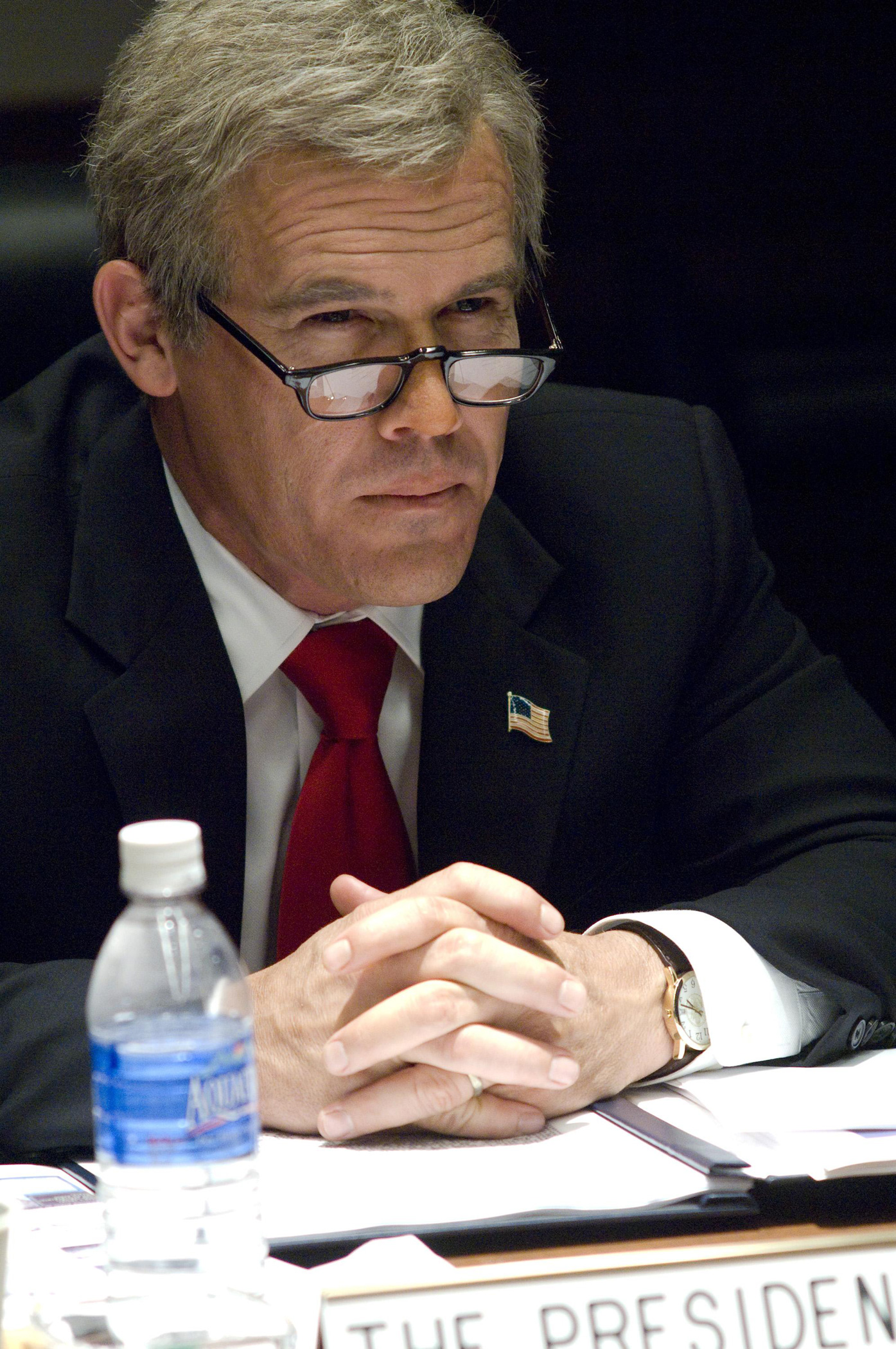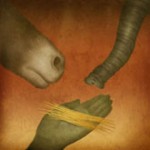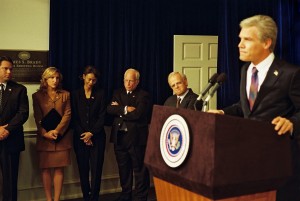Misunderestimating ‘W.’
REEL LIFE Director Oliver Stone is a decorated Vietnam vet, yet his movie about George W. Bush conveys little sense of the war in Iraq.
Jul 31, 202035.1K Shares663.8K Views
Lions Gate Entertainment
Perhaps the most impressive trick the director Oliver Stone pulls off in his new biopic “W.” is giving Bush-hatred a bad name.
Historians are sure to debate whether George W. Bush is the worst president in U.S. history or merely among the worst. Not since James Buchanan, whose lassitude in the face of a national crisis over slavery and secession is credited with making the Civil War practically inevitable, has there been a credible contender for that supreme dishonor.
Illustration by: Matt Mahurin
But no president has ever waged two wars at the same time without winning either; lost a major U.S. city in a flood of incompetent bureaucracy; unconstitutionally declared that detaining suspects without trial, spying on domestic communications without a warrant or torturing foreign nationals was an inherent power of his office; transformed a record budget surplus into an unprecedented deficit, and contributed to a global financial catastrophe.
Given all that, Stone might be expected to register more of a case against Bush. But Stone has protested that his new film, which opened Friday, isn’t intended to be an indictment of the president. That claim rings hollow, however, when faced with how relentlessly buffoonish and venal Stone presents Bush, particularly in a film that purports to explore the 43rd president.
More bizarre, however, is the fact that a viewer unfamiliar with the past eight years would leave the movie thinking nothing happened during Bush’s tenure except the Iraq war. There’s a cursory mention of torture, domestic surveillance and Guantanamo Bay — other articles in the case against Bush — but they pass from the screen in less time than it takes to walk to the concession stand.
The war overhangs everything in “W.,” which may not be surprising, given that Stone is a Vietnam veteran. But unfortunately, Stone doesn’t provide a particularly accurate view of the war, either.
“W.” marks the third movie about national politics from Stone. “JFK” was a litigants’ brief against the idea that John F. Kennedy was assassinated by a lone gunman. “Nixon” presented Richard M. Nixon as the corrupted Shakespearean demon, Richard III. “W.” is more like “Nixon” than “JFK,” except it doesn’t have much patience with narrative coherence, though it is less operatic than either of Stone’s previous political movies.
“W.” opens and closes with Bush standing in center field at Arlington Stadium, former home to the Texas Rangers franchise that Bush once owned, attempting to catch a fly ball. At about the film’s mid-point, Bush, played by Josh Brolin, walks through the outfield with his father, played by the chisel-jawed James Cromwell, and tells him center field is where he finds peace. Naturally for such an unsubtle film, the final scene of the film is a nightmare in which Bush can’t find the ball. Get it?
Lions Gate Entertainment
Perhaps the most generous way of describing Stone’s narrative structure is to say that it avoids convention. Bush is explored through a series of scenes: one moment he’s president in a pre-Iraq war Cabinet discussion; the next he’s drunk on the morning of his 40th birthday, and soon he’ll be railing against his father’s “weakness” for losing the 1992 presidential election.
The film’s jumps through time aren’t merely problematic for their own sake. “W.” is supposed to provide the introspection into Bush’s character that the president himself rarely exhibits. Stone has a reputation for being an un-introspective filmmaker — the film critic Elvis Mitchell on NPR once remarked that Stone was the only great director with A.D.D. — but presenting little more than vignettes, it’s difficult for the Stone to establish consistent themes to explain Bush’s behavior.
For example, one of the longest sustained scenes concerns Bush’s conversion to Christianity. Frustratingly, Stone doesn’t follow the thread through, aside from the superficial treatment of showing Bush ending war-cabinet meetings with a prayer. It’s easy enough to establish that Bush is an entitled buffoon who disappoints his father — Cromwell’s George H.W. Bush says he’s “deeply disappointed” in his son twice in the film so you don’t miss it — but that’s not enough to sustain a movie.
It’s the Iraq war that truly drives Stone’s outrage, though. Yet his depiction of the war is as much a caricature as his depiction of Bush is. This is all the more disappointing considering that Stone is himself a Vietnam veteran. He may not have served in Iraq, but he has a deeper knowledge of the reality of war than most, if not all, of his contemporaries.
Stone’s style is to research his subject matter exhaustively, as “JFK” demonstrated. His choice of scene shows a deep familiarity with the seminal moments of the war. An August 2002 meeting of the war Cabinet on Bush’s ranch in Crawford, Tex. — one of the last big pre-war discussions, and reportedly the one in which Secretary of State Colin L. Powell fatefully signed on to the invasion — is meticulously recreated. No detail escapes Stone: Tommy Franks, the general in charge of planning the war, is chewing an unlit cigar, a real-life habit of Franks. This is an obscure fact even among Iraq-war obsessives.
But Stone’s attention to detail is undone by his indifference to context. The two key scenes between Bush and Vice President Dick Cheney — played over the top by Richard Dreyfuss — present the vice president as mouthing lines attributable to his critics. In the first, a lunchtime discussion with Bush, Cheney enthusiastically pushes Bush to embrace aggression when there’s a “one-percent chance” of things going wrong in its absence — journalist Ron Suskind’s distillation of Cheney’s views.
In the second, Cheney delivers a frothing-mad speech in the situation room, larded with Googled facts about military bases all around the Middle East, urging for the U.S. to maintain a permanent presence in the Middle East to establish “true empire.”
What’s more, Iraq itself is a pure abstraction, never present in the film. The closest it comes to appearing is during a teleconference with Franks, in which the general tells Bush that the war is a tougher fight than expected. A single scene in which Bush visits wounded soldiers is the only reference to the war’s human cost. The millions of Iraqis whose lives have been forever changed by the war have no place in “W.”
It’s a stunning choice for a movie so heavily motivated by anti-war fervor. The central error of the Bush administration — indeed, the only actual governing decision given any screen time — does not actually appear. Stone is overtaken with the process of its decision-making: the meetings in which the war is mooted.
But even in those interminable scenes, all Stone offers is easily-Googled punch lines from Bush’s principal aides, without attempting to explain why each character acts as he or she does. Powell appears as something of a Cassandra, issuing his famous “you break it, you bought it” line, but acquiescing to the invasion. Stone expends no effort at explaining Powell’s behavior.
Even a polemicist is obligated to, at least, offer an argument for what motivates his subject. A movie that offers pure polemic is boring enough. But a movie that offers poor polemicism, bizarre presentations of its indictment and narrative incoherence is a waste of time.
In the end, W. is an election gimmick: rushed to deliver an authoritative excoriation of Bush just as the country votes to elect his successor. It fails as completely as a political movie can fail. Even Bush haters are forced to admit that Bush, Cheney — and the country — deserved better treatment.

Rhyley Carney
Reviewer
Latest Articles
Popular Articles


